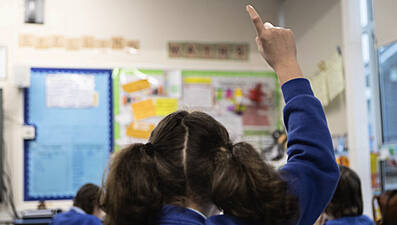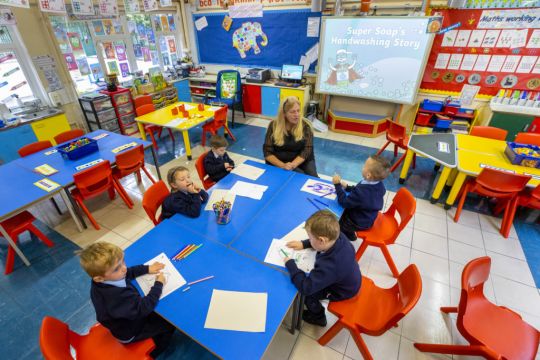The return of students to schools in late August did not bring a 'significant increase' in Covid transmission, according to Prof Philip Nolan.
In a series of tweets, the chair of the National Public Health Emergency Team's (Nphet) Epidemiological Modelling Advisory Group said the reopening of schools "has not been associated with a significant increase in the level of infection, when increased testing is taken into account".
He added the risk of someone testing positive after being identified as a close contact in a school setting is low.
Although the number of cases among children and adolescents increased through the summer as the Delta variant took hold, the transmission has now stabilised "at a high level" among children under 12 and "decreased markedly in 13-18 year olds".
This pattern is typical of increased case ascertainment due to intensive testing, that is, a very large increase in testing is finding (largely asymptomatic) cases that we were not detecting before, rather than a true increase in the underlying level of infection. 7/14 pic.twitter.com/o4V77T7efP
— Professor Philip Nolan (@PhilipNolan_SFI) September 22, 2021
Advertisement
"When schools reopened it was inevitable that some children attending school would subsequently develop symptoms or test positive," Prof Nolan said.
"It was prudent at that time, with limited experience of the Delta variant in schools to isolate and test their contacts," he added.
Earlier, the Department of Health confirmed close contact and testing measures for primary schools and childcare facilities would change from Monday, ending the need for children aged 12 and under to restrict their movements if they are designated a close contact in a non-household setting, such as school, so long as they are asymptomatic and have not been instructed to do so by a local public health team.
Prof Nolan said the return of schools at the end of the summer brought a three to four-fold increase in the number of children being sent for Covid testing, jumping from 300 tests per 100,000 for children aged 5-12 to over 1,000 tests per 100,000.
The most important intervention now to keep schools and children safe is to support parents and guardians in keeping children with symptoms suggestive of SARS-CoV-2 home from school and caring for them. 14/14
— Professor Philip Nolan (@PhilipNolan_SFI) September 22, 2021

"We are currently testing 1 per cent of this population every day," he said, however: "The yield from this additional testing is low."
Prof Nolan said the policy change for schools and childcare facilities would allow close contacts to continue to attend school and not require them to be tested. This will likely see a reduction in the number of students missing school due to having to restrict their movements and will also ease the pressure on the testing system.
"The risk associated with allowing an asymptomatic in-school contact to continue schools is low compared with the impact of excluding that child from school.
"The most important intervention now to keep schools and children safe is to support parents and guardians in keeping children with symptoms suggestive of [Covid] home from school and caring for them," Prof Nolan added.







